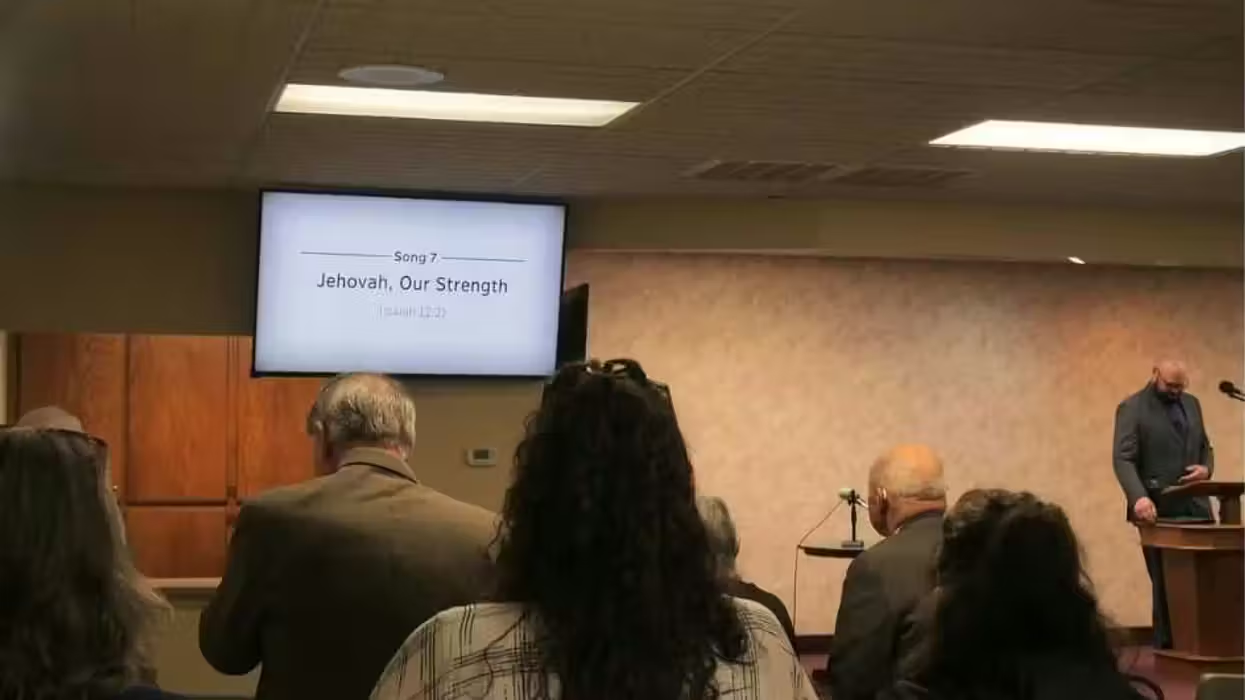
Keturah Hickman

Our first visit to a Kingdom Hall.
After attending a somewhat run-of-the-mill novus ordo Mass with only a few redeeming qualities, my husband and I decided to visit another church in Nevada that is possibly one of the most hated and misunderstood Christian denominations — even with the Latter-day Saints and Seventh-day Adventists.
It was both his and my first time attending a Jehovah’s Witness church.
'I personally don’t want to go to heaven, but want to remain on Earth when we’re resurrected. I want to live among the animals and trees and plants and not rule over others.'
We walked 40-some minutes to the Kingdom Hall of Jehovah’s Witnesses and were greeted warmly, even though we were two minutes late and the congregation had already begun singing the first hymn. The setting might have been bland, but I felt I had achieved a bucket-list goal.
For years I’d tried to visit a Kingdom Hall. The Jehovah's Witnesses were one of the last churches to reopen nationwide after COVID, offering online meetings for nearly two and a half years, until summer of 2022. Even after that, many remained closed for another year, and a large portion still host hybrid Zoom/in-person gatherings for the immune-compromised.
To many, the inside of the meeting hall would appear no different from a conservative Protestant church. Most women wore skirts or business suits; the men were in full suits. The carpet was gray, the walls plain, decorated with a few pictures of flowers. There were no windows.
Rows of theater chairs faced a pulpit. Though the Jehovah's Witnesses do not have ordained ministers, any baptized man may teach from Scripture. On the day we visited, a guest speaker from Idaho — tailored suit, bright red tie — delivered a sermon much like any Protestant pastor’s, citing extensive Bible verses to support his points. There was no American flag, unsurprising given JW pacifism. Jehovah's Witnesses do not vote, and while they don’t forbid self-defense, they register as conscientious objectors during drafts. They believe that those who live by the sword will die by the sword (Matthew 26:52).
RELATED: Church-hopping: Confessions of an itinerant worshipper

The message, titled “Is There in Fact a True Religion from God’s Standpoint?” began with statistics: 85% of the world identifies as religious, 31% Christian, across 45,000 denominations — with a new one forming every 2.2 days. “But how does Jehovah want to be worshipped?” he asked.
He read from Mark 7:6-7 and James 1:26, then cited Solomon: True religion is to fear God and keep His commandments (Ecclesiastes 12:13). More verses followed — Isaiah 48:17-18, Micah 6:8, Matthew 7:16 — arguing that true belief and conduct must fit like a well-tailored suit, not mismatched pieces.
He condemned most Christian denominations for justifying slavery so that men might Christianize pagan souls for the kingdom of God. He pointed out that the Jehovah’s Witnesses never supported such horrid beliefs. (He failed to mention that slavery was already abolished by the time they came along.) He warned against fatalism, ancestor worship, and faith in human institutions. “If a religion permits or promotes practices the Bible condemns, it is not true,” he said, citing Colossians 3:10, John 8:32, James 3:17-18, and others.
“Truth is found in the word of God,” he concluded. “When we love the word, we are peaceable.”
The sermon ended with the JW hymn “My Father, My God and Friend (Hebrews 6:10)."
After the hymn, an elder read from "The Watchtower," the denomination’s monthly study magazine. Before the group was called Jehovah’s Witnesses, it was the Watch Tower Society, founded by Charles Taze Russell in 1881.
The article that day was “Jehovah Heals the Brokenhearted” (Psalm 147:3). The elder read each paragraph aloud, then passed the microphone for congregants — men and women, in person or on Zoom — to share reflections.
Here are some highlights.
It was repetitive but sincere — an hour-long group meditation on comfort and resilience.
The service ended with another hymn. There was no tithe, and communion is held only once a year for those who believe they are among the 144,000 destined for heaven.
Afterward, several congregants welcomed us. One woman, Linda, about 70, explained that she had converted from Protestantism before marrying.
“There aren’t many differences between us and other churches,” she said, “except that we don’t teach what other places teach.”
“Such as?”
“We teach that Jehovah is Almighty God and that Jesus is His son and our Messiah. And we don’t believe in hellfire,” she said. “You can’t really find that idea in the Bible.”
I asked her if that meant that she believes everyone goes to heaven or if they just die.
She said, “The Bible says 144,000 go to heaven to be kings and priests to be the government of the kingdom of heaven that will come to Earth. I personally don’t want to go to heaven, but want to remain on Earth when we’re resurrected. I want to live among the animals and trees and plants and not rule over others.”
Linda gave me a small Bible — I gladly accepted it because it was lightweight and would fit perfectly into my backpack, and until now I had only been able to carry a New Testament. She explained to me that the Jehovah's Witnesses didn’t approve of many of Scofield’s notes in the KJV and that their version had more accurate cross-references. I love having various versions of the Bible to read through, so there was no complaint from me!
She invited us to join her husband and friends at a cafe for a late lunch. And so we went with about 20 other congregants. I sat by a woman just a little older than I. Ozzy had been raised in the Jehovah's Witnesses and had spent much of her youth as a traveling nanny. She told me that nearly six years ago she had married a Grace Baptist Church man and had a daughter with him. They eventually divorced. “I’m just grateful my daughter is learning about God in both homes she’s raised in," she said.
Although Ozzy did not speak ill of her ex-husband, it was clear that she thought her expression of faith was more valid than his. So I asked her what was different between the two theologies, in her opinion.
“That’s a good question," Ozzy said. "Not much."
Then she added:
Except how we define the Trinity — you know, you can’t find that word in the Bible. I’ve searched every translation of the Bible, so I know. We both believe in the concept, though JW is more literal and bases their definition on how the Bible describes it. We believe that the Father, the Son, and the Holy Spirit are three separate entities united by a common will. Grace Bible Church is more Catholic when they talk about the Trinity.
After a day with them, I found them sincere and Bible-focused, hardly cult-like. They loved God, quoted Scripture freely, and treated us with warmth — even when I somewhat aggressively asked about one of their more infamous beliefs.
“I have heard that your church does not allow people to get blood transfusions and that this has caused many people to die.”
"Yes, we believe blood is sacred and not to be spilled in war nor ingested for any reason," Linda responded. "But blood can be divided into four components, and it is okay to receive any of those minor fractions.
"Most people don’t even need blood transfusions as much as they used to," she added, noting that "scientists have discovered that there are healthier ways to fill a low blood count with supplements and iron.”
I’m not sure what makes a group a cult any more. Some say it’s when people follow a man rather than the Bible — but the Jehovah's Witnesses have no central figure. They encourage personal Bible study.
Interestingly, 65% of members are converts — adults who join by conviction, not birth. While many leave, those who stay do so deliberately. Angry ex-members exist in every religion, and that alone doesn’t define a cult.
Much of JW doctrine is nothing your average Protestant would quarrel with: anti-abortion but pro-birth-control, personal responsibility for family size, and no institutional oversight (beyond guidance from JW Broadcasting in New York). There’s also no enforcement mechanism for rules on blood transfusions or holidays.
There are 8.6 million Jehovah’s Witnesses worldwide, compared to 15.7 million Jews, 17 million Mormons, and 22 million Seventh-day Adventists. Many Protestants single out the denomination's rejection of transfusions, but the Jehovah's Witnesses are neither faith healers nor anti-medicine. They are pacifists but politically moderate and scientifically literate.
Jehovah's Witnesses founder Charles Taze Russell was raised Presbyterian. At age 13 he left his church to embark upon a kind of quest for the truth, for a time backsliding into unbelief.
Known for writing Bible verse on fences as a way to evangelize, he founded a group called the Bible Student Movement in 1879. Much like Mormons, the Two by Twos, and the Jim Roberts Group, his group grew by sending out pairs of men to preach the word of God directly from the Bible.
Despite Russell's zeal, his life was riddled with scandal. He divorced his wife after she demanded a larger editorial influence on "The Watch Tower." He sued for libel often, occasionally winning — one time the jury mockingly ruled in his favor but gave him only one dollar, and so he filed an appeal and received $15,000.
After wrongly predicting the end of the world numerous times, Russell died in 1931. The group split apart. Approximately a quarter of the members remained faithful to Russell’s successors and began calling themselves Jehovah’s Witnesses.
Their use of the name “Jehovah” also irritates critics, though it appears in the King James Bible (Exodus 6:3; Psalm 83:18; Isaiah 12:2; 26:4).
Their rejection of the Nicene Trinity remains the sharpest point of division — a doctrine codified by the Catholic Church and later adopted by nearly all of Protestantism. It’s an irony of history: Protestants who define themselves against Rome still use Rome’s creed as the boundary of belief. Disagreement with that doctrine, however, does not make a faith a cult.
One striking point from the sermon stayed with me: Every 2.2 days a new denomination is created.
Until the 16th century, Christianity had only a handful of branches. Now there are 45,000. The JW speaker said it is because everyone seeks truth; I think it’s because we’ve forgotten love.
As Paul wrote in 1 Corinthians 13: “If I have all faith so as to move mountains but do not have love, I am nothing.”
What merit is truth without love? God does not honor self-righteous division. This, perhaps, was Martin Luther’s and Henry VIII’s greatest sin — their pride tore Christ’s body into pieces.
Protestants readily maintain friendly regard for Judaism, which does not accept Christ’s divinity, while showing far less tolerance for groups such as Jehovah’s Witnesses, Mormons, or Adventists — who profess Jesus as Lord and Redeemer.
For this reason, I urge believers: Visit all churches. Seek unity where possible. Not to follow fads, but to love the whole body of Christ — even the Jehovah’s Witnesses.